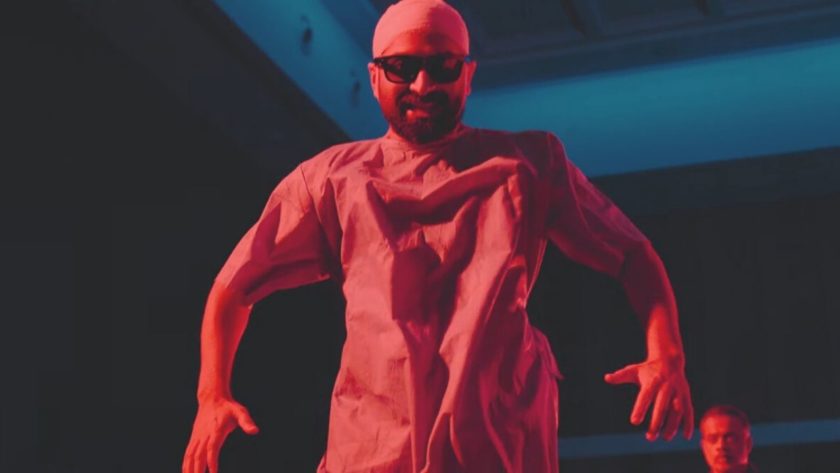Seas stretch far and wide into the bosom of clouds while closer to the shore, in the waters bearing scattered colours of the dusk, two boats lie, still and abandoned as the sun sets on them. Two young brothers left stranded in a life from where sunshine and warmth have departed embrace each other in their sleep and as those forsaken boats anchored nowhere in the midst of the seas, they restlessly await their journey.
The Enigmatic Descent into Trance
The frantic trance, its start can be traced back to this piercingly innocent sleep where they cling on to each other in the hopes of escaping the blows of trauma, only the stabs are too hard and powerful, chasing them towards deadly means of deliverance. With the departure of one, the other is left shipwrecked, splashing about in deep, tempest waters, attempting to rise against every pull which entices him into the breathless bottom of the sea. Mysskin’s Psycho carried the following words of psychologist Abraham Maslow- ‘We are all simultaneously worms and gods.’ This is true of Trance too as it hails that we are our own shipwreck and salvation in its terrific, startling chronicle of human suffering.
Viju Prasad: A Tormented Soul’s Ambitions
Trance unfolds as the saga of a tormented man navigating the highs and lows of life, offering a unique subversion in its epic portrayal of profound descent. The narrative revolves around Viju Prasad, ensnared in the clutches of his own vanity and psychosis, spiraling into a state of trance that leads him toward enlightenment. Daphne Du Maurier, in the novel Rebecca, alludes to people experiencing trances, following mysterious laws dictated by their subconscious minds. Viju Prasad embodies one of these perplexed individuals, and his trance reflects the intricate workings of his anguished heart, finding solace in ambitious pursuits.
Dreams vs. Healing
Introduced against the backdrop of a glorious morning sky with the rising sun and distant church prayers, Viju appears destined for an evangelical future. However, his home becomes a confining space, haunted by past horrors framed through dark room doors. The tainted mirror he gazes into represents the confines of his house, yet Viju maintains a positive and confident outlook, hoping for amazing days ahead. The daily ritual begins with desperate attempts to overcome pain, evolving into a grand make-believe performance.
The Dangerous Adventure Awaiting Viju’s Trance
The mirror serves as a holder of Viju’s ‘image’ rather than a reflection, revealing his ambitions before unveiling the repressed trauma deep within his heart. As his ambitions press down on the hidden wounds, the scars start to emerge, emphasizing that dreams only conceal, not heal, making the impending adventurous journey perilous.

Trance delves into the intricate realms of collective and individual psychosis, exploring the unquestioning surrender to religious illusions and the perilous self-consumption of vanity. These themes are not only interwoven in bewildering ways but also serve as the theological core of the narrative.
Exploiting Faith for Material Gains in the Temple of Ambition
In his book Homo Sapiens, Yuval Noah Harari discusses the rise of Buddhism, linked to the worship of man as a divine being. The inception involves an individual’s encounter with suffering and profound introspection. Similarly, Viju’s story unfolds as he, troubled by family tragedies, departs from his home to navigate the crowded streets of Mumbai. However, Viju’s departure becomes a manifestation of his defense mechanism failing to evade trauma. Unlike spiritual leaders like Lord Buddha, who sought to eliminate human suffering, Viju manipulates it to serve his ambitions of invincibility. The dizzying title track mirrors the delirious interior of Viju’s ambitious mind, intertwining unresolved trauma with his present and future as the Chosen One.
Unpacking Biblical Names, Holy Trinity, and Ominous Omens
As corporate magnates Solomon and Isaac designate Viju as their man, Solomon’s proclamation, “He is the ONE,” adds a layer of irony. Solomon’s name, derived from the Bible, signifies the wealthy and wise king. Ironically, in the film, Solomon Davis schemes to establish the largest evangelist organization, exploiting the collective consciousness and faith of believers for material gains. Despite some discrepancies, the characters are elevated by the stellar cast’s winsome and electrifying portrayals. The ‘TRIpac’ group echoes the pivotal concept of the Holy Trinity in religion. Viju’s excitement at the opportunity is marked by a symbolic fall as he slips and limps through Solomon and Isaac’s royal chambers, ominously foreshadowing the sinister spiral ahead.

Dizzying Descent: Viju’s Fall and the Looming Sinister Spiral
Thomas, who, in the biblical narrative, transitioned from skepticism to unwavering faith, undergoes a reversed arc here, exposing the darkness within the seemingly divine promises. Cradling his lifeless daughter, he rushes to the Church, yearning for a resurrection. Interestingly, he doesn’t head straight to the crucified holy figure; instead, he seeks blessings from Joshua, vividly depicting the human tendency to worship men before the divine—a confusion of one for the other, a reflection of man’s inventions of objects of faith.
Reversed Arc of Faith: Thomas’s Journey from Skepticism to Desperation
A bold stroke unfolds in the portrayal of the holy figure witnessing Thomas’s plight. Jesus himself seems to weep, bleed, and feel the shame of being unable to help—a poignant commentary on the farce of blind faith. The illusory state of Joshua begins to crumble, and after the ride of vanity, he returns to the human tragedies within Thomas’s house, with his outburst framed through the door. Here, darkness lies outside, not within the house. Reconciling with trauma plays a crucial role in dispelling illusions. Joshua revisits the abandoned home, willingly embracing inevitable suffering to ultimately break free from its painful grip.
Dismantling Illusions: The Bleak Promises of Divine Light
The climactic sequence unfolds as a daring subversion of religious myth, reminiscent of the birth of Christ, during the Mega Miracle Fest on December 25th. It marks the day of Viju’s rebirth and Joshua’s demise as the god-man confesses to being a fraudster. No stars shine; only thunderous skies announce the end of the farce and the arrival of genuine hope. The settings, misty and hellish, with bloody bursts of red, mourn the collective psychosis of the crowd. In line with the tale’s inherent irony, another nuanced touch is Paul serving as the medium for Joshua Carlton’s confessions to reach Matthews and the people. Interestingly, Paul, the Apostle, taught the Gospel of Christ to the first-century world.
Atheist and existentialist in its outlook, terrified of men and their shipwreck in its soul, Trance strikes with all that counts and ultimately controls us, ranging from trauma, religion, corporates to human ambition. Paraphrasing, ironically again, the words of faith minister S. Kelley Harrell, in the end note to this exploration of thematic nuances in Trance, I only add: ‘Interpreting that ecstatic trip in a way that better grounds our reality, TRANCE is way worth much.’



Be the first to comment on "Anwar Rasheed’s Trance is both exhilarating and terrorsome"